ap bio : unit 5 cram sheet (copy)
Author Notes
hello there ap bio student !!! thank you for visiting my unit 5 cram sheet on heredity ! the content of this sheet is based on the ap daily videos (cuz they r so useful) and my teacher lectures and handouts :]
like this cram sheet? i got more!!! see it via my profile <33
at the end of each section will be provided with external links to help nourish the study grind!!
╭ Other Resources :
:: mcq progress check﹒﹒already took the mcq? “take it again” in flashcard form with an additional explanation of the answer! (frm urs truly :D )
:: cararra ﹒﹒ 24 min ap bio review video based from the campbell biology 11th edition textbook!
:: sticky science﹒﹒short, bite-sized review videos in the form of reels from a previous ap bio student who got a 5 on the AP exam! (there’s no unit 5 yet </3)
:: the APsolute recAP﹒﹒15 min review video based on all the topics of unit 5!
:: khan academy ﹒﹒the entire unit 5 course from khan academy!!
:: fiveable ﹒﹒ reviews unit 5 with articles and quizzes for you to practice your knowledge on!
﹙✦﹚﹒﹒abbreviations will be used throughout this sheet!! gl!
﹙5.1-5.2 - Meiosis﹚
→ meiosis ensures the formation of haploid gamete cells in sexually reproducing organisms
brings genetic variation; new combo of alleles = faster generation
evolutionary junction that makes sexual reproduction possible— MUST have haploid gametes
✦﹒diploid is two sets/pairs of chromosomes
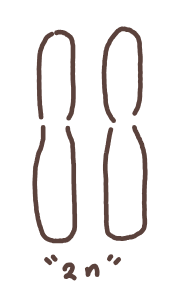
pairs differ in size, shape, genetic info, and centromere location
homologous chromosomes are diploid
have the same length, position, and sequence of genes
one is paternal and one is maternal
diploid organisms have two copies of each chromosome; one is paternal and one is maternal
cell gets one diploid from each parent
ex: skin, leaf, and hypha cells, basically anything that is somatic
✦﹒haploid is one set of chromosomes
ex: gamete, sex cells (egg, pollen)
results w/daughter cells that have half the number of chromosomes as parent
 haploids are also represented as “n”, as shown on the left. to the left demonstrates that the daughter cells have half of the chromosomes as the parent.
haploids are also represented as “n”, as shown on the left. to the left demonstrates that the daughter cells have half of the chromosomes as the parent.involves two rounds of meiosis (meiosis 1 and 2)
meiosis 1 remains double pairs (2)
meiosis 2 remains single pairs (4)
BOTH undergo PMAT order
✦﹒meiosis results in 4 genetically different haploids, caused by the following—
crossing over, which is where non-sister chromatids of homologous chromosomes exchange segments
occurs in prophase 1 and metaphase 1
forms recombinant chromosomes
 visual of crossing over
visual of crossing over
random assortment, where crossing over has many possibilities on the chromosome depending on how they are ordered
occurs in metaphase 1
fertilization, where info from each parent contribute to egg
a random gamete from each parent fuse to form a diploid
important events in meiosis—
synapsis and crossing over - prophase 1
tetrad (homologous pairs) line up @ the metaphase plate - metaphase 1
homologous pairs separate - anaphase 1
╭ Other Resources :
:: amoeba sisters ﹒﹒ in depth explanation of meiosis!
﹙✦﹚﹒definitely understand all the causes of genetic variation and concept of meiosis
﹙5.3 - Mendelian Genetics﹚
→ shared and conserved processes support the concept of common ancestry because tenures link organisms by line of descent
processes like cellular respiration and transmission of genetic info allow the continuation of life through generations
✦﹒law of segregation describes the inheritance of genes and traits on different generations
when chromosomes are separated into daughter cells during meiosis
separation of alleles allows genetic variation (mixed like punnet squares)
✦﹒law of independent assortment describes allele of two or more different genes are sorted into gametes independently of one another
one trait is not automatically inherited w/another
✦﹒there are different patterns of inheritance—
autosomal dominant, also known as complete dominance, where the dominant allele being present will cause the resulting phenotype to be that trait
genotypes affected— heterozygous (Aa), and homozygous dominant (AA)
autosomal recessive, where genotype must be homozygous recessive (aa) in order to express the recessive trait/phenotype
skips a generation, as it will lead to carriers if a dominant allele is present
patterns of inheritance are typically identified through pedigrees
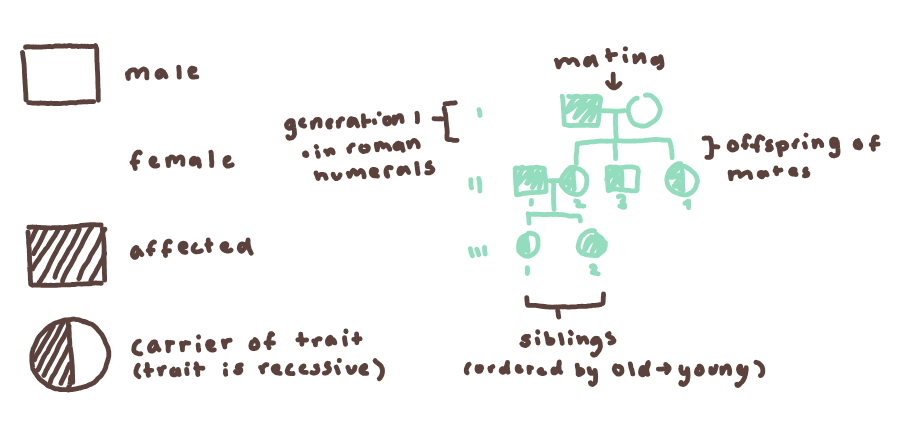
✦﹒punnet squares help predict offspring genotypes based on the parents’ genotype
monohybrid cross has a 3:1 ratio
dihybrid cross has a 9:3:3:1 ratio
╭ Other Resources :
:: amoeba sisters ﹒﹒ breakdown on monohybrid and dihybrid crosses!
﹙✦﹚﹒while all concepts are a must-know, definitely understand how to read a pedigree, its gonna show up A LOT
﹙5.4 - Non-Mendelian Genetics﹚
✦﹒linked genes are located on the same chromosome, typically inherited together
map distance tells us how close together linked genes are
closer genes → likeliness genes are inherited together
gene mapping..
start with the gene with the highest recombination frequency
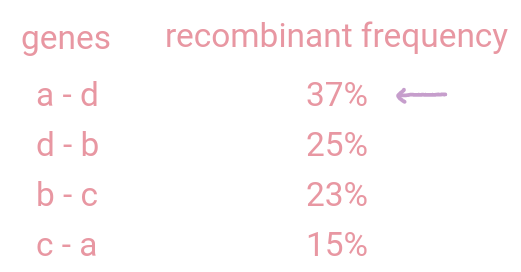
determine the location on the chromatid
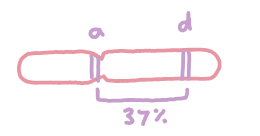
repeat for the other genes; go from highest recombination frequency to the lowest
there may be more than one possible location sometimes, but let the other recombination frequencies help narrow it down!!
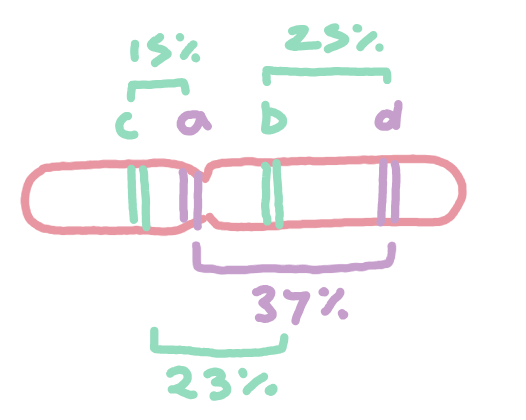 finished gene mapping of sample problem
finished gene mapping of sample problem
✦﹒in this unit, the chi-square test tests for whether or not genes are linked
test has two variables—
null hypothesis (Hn) - states that there is no relationship or difference between the two groups of data
in terms of this unit, the genes are independently assorting
alternate hypothesis (Ha) - one of the many hypotheses that states observed results are due to a non random cause
in terms of this unit, an alternate hypothesis would state that the genes are linked
to use this test—
identify the expected and observed values (usually given via table)
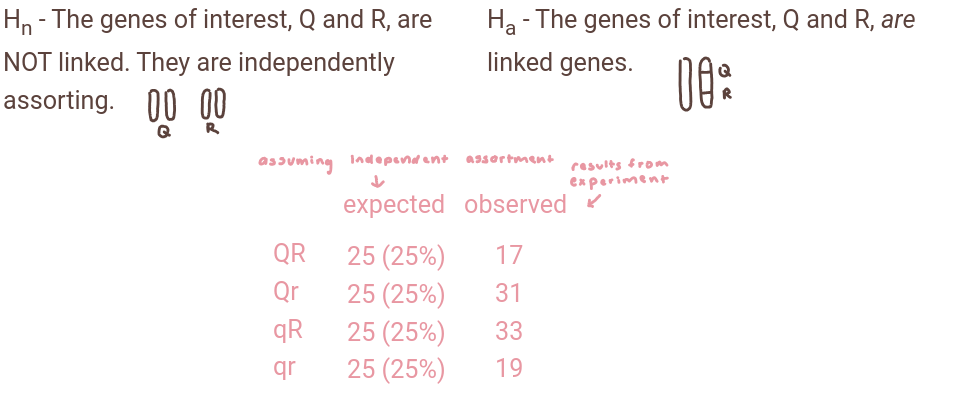
plug into the formula and find the chi-square (x2) value

use the table below to find the critical value using the p-value and df
if the p value if not given, p = 0.05
df → degrees of freedom = n (number of variables) - 1

compare the chi-square value with the critical value
if chi-square > crit value →reject the null hypothesis, indicates that there is a significant difference present
if chi-square < crit value →cannot reject the null hypothesis, indicates that there is NO significant difference present
✦﹒recombinant frequency (RF) can help determine whether or not a gene is linked or independently assorting
RF = # recombinants / total offspring x 100
if RF is greater than 50%, there is no gene linkage
if RF is less than 50%, the genes are linked
✦﹒sex-linked genes are traits determined by sex chromosome genes
a pattern of inheritance that is non-mendelian
recessive traits are likely given to male (since they hold one X sex chromosome)
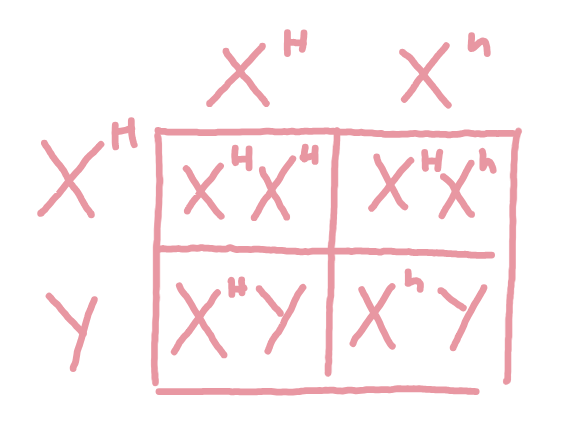 visual demonstration of sex-linked genes being passed on. notice how there is a 50% chance that the male will either get a recessive or dominant allele if one X chromosome has a recessive allele
visual demonstration of sex-linked genes being passed on. notice how there is a 50% chance that the male will either get a recessive or dominant allele if one X chromosome has a recessive allele
✦﹒besides those two, there are many others—
non nuclear inheritance, maternally inherited trait from the chloroplast or mitochondria
this is possible because the chloroplast and mitochondria have their own genome
mother is more likely to pass this trait (mitochondrial disorder)
this is because majority of the sperm’s genetic info is destroyed before getting to pass it on
polygenic inheritance, two or more genes have additive effect on one phenotype
majority traits are polygenic
ex: height, hair
incomplete dominance, when neither allele is fully dominant and offspring expresses a new phenotype (usually a mixture)
ex: white (yy) crosses with red (YY) = pink (Yy)
codominance, two alleles that affect phenotype are both expressed
ex: blood type
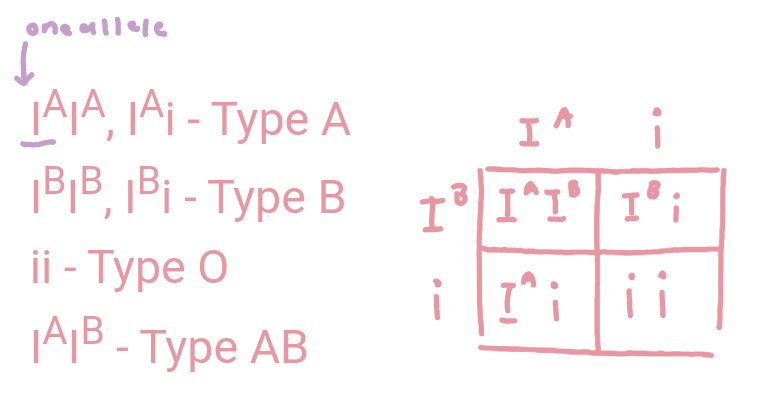 image on the right is what determining blood type is like
image on the right is what determining blood type is like
╭ Other Resources :
:: 4EvaBio ﹒﹒ goes over gene linkage, recombination frequency, and the chi square test using an example! (I recommend following along)
:: bozeman science ﹒﹒ explains genetic recombination and gene mapping! (provides practice at the end)
﹙✦﹚﹒ABSOLUTELY get comfortable with application of chi square with linked genes. Also understand sex-linked genes bc I guarantee that there is will be a mcq with the answer being that it is sex-linked rather than autosomal recessive/dominant
﹙5.5 - Environmental Effects on Phenotype﹚
✦﹒phenotypic plasticity is the ability of one genotype to produce more than one phenotype
environmental factors can influence gene expression hence causing this
this includes changes in the environment
phenotypic diversity can be due to only environmental factors as the gene can express different things yet be the same
﹙✦﹚﹒don’t have too much focus on this criteria, just understand that changes in phenotype does not necessarily mean that the gene is altered, just understand phenotypic plastically is all
﹙5.6 - Chromosomal Inheritance﹚
✦﹒recall the following that result in genetic variation—
law of segregation, which provides more opportunity for varied combinations of alleles when fertilization occurs
independent assortment, which provides more possible gene combinations when fertilization occurs
inheritance of gene is random; not connected to inheritance of any other gene
random fertilization, which is the concept that any genetically unique sperm can join with any genetically unique egg
leads to offspring with a genetically unique combo of chromosomes
✦﹒nondisjunction is the failure of chromosomes to fully separate during the formation of gametes
often caused by malformation of egg/sperm cells
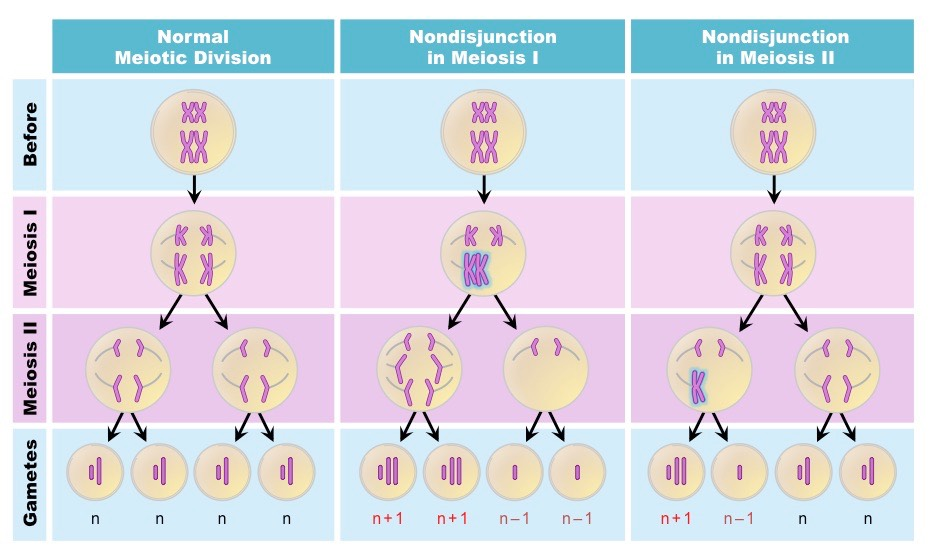 visual of nondisjunction in meiosis 1 and 2, with regular meiosis for comparison
visual of nondisjunction in meiosis 1 and 2, with regular meiosis for comparison
leads to genetic disorders
✦﹒karyograms help identify whether or not there is a disorder
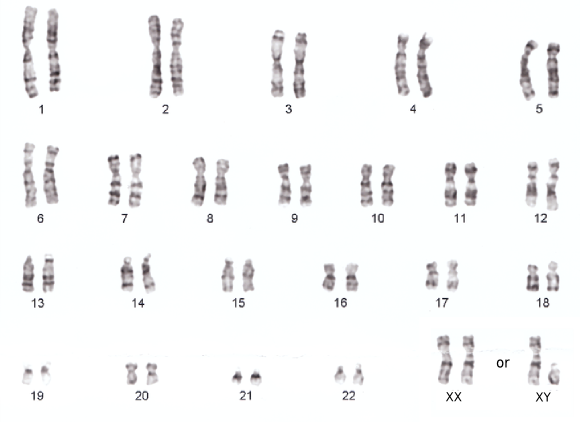 karyogram of a NORMAL individual. females would have XX and males would have XY (one chromatid for X and one for Y)
karyogram of a NORMAL individual. females would have XX and males would have XY (one chromatid for X and one for Y)
chromosomes are organized by size
chromosome 23 is the sex chromosome; determines sex
disorders can be identified if there is an additional chromatid, missing chromatid, or differently shaped pair of chromosomes present on the karyogram
also called idiogram
﹙✦﹚﹒understand the ways in which genetic variation may occur + nondisjunction. be comfortable with reading a karyogram and identifying the abnormality present
 Knowt
Knowt
